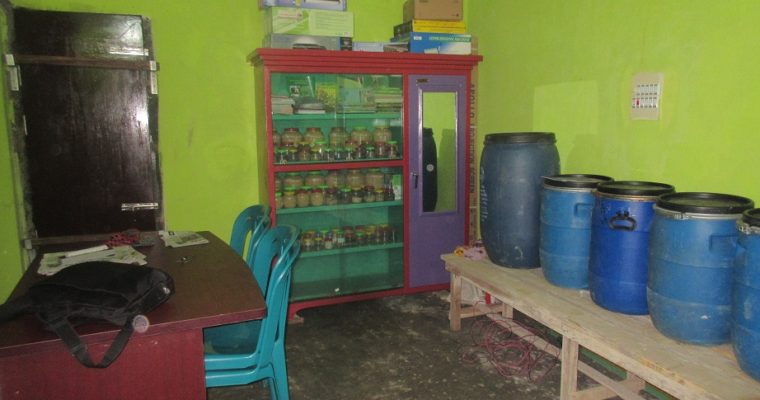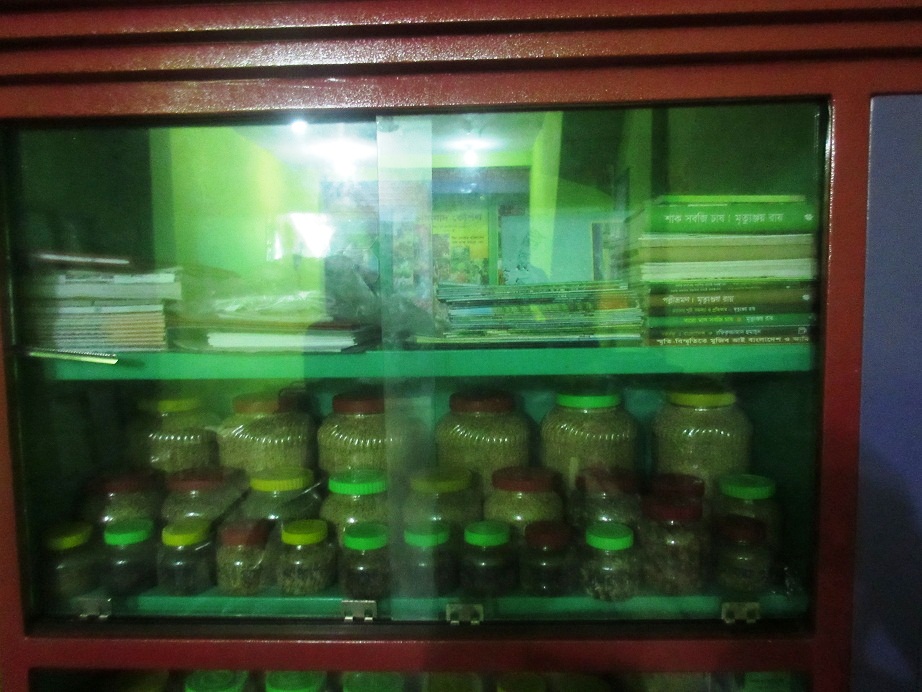Farmers in Bangladesh used to preserve and reproduce seeds. However, this is no longer the situation. Farmers are losing control of the seeds. Nowadays, more than 90% of vegetable and rice seeds are controlled and supplied by private companies.
MTCP2 Bangladesh made efforts to regain the control of seeds for farmers by forming groups of farmers and providing them with training on quality seed production and preservation; supporting them to establish a Community Seed Bank; supporting them in their campaign and helping them in marketing their products locally. The seed bank will help the group members and the community to be self-reliant when it comes to their seeds requirement and it can be a source of additional income as well.
MTCP2 Bangladesh has been working to ensure seed security for farmers by promoting an eco-friendly rice seeds production and preservation technology called Maria Model. Through MTCP2, 14 seed-producing groups have been formed and were given training and technical support which is part of the value chain development. These groups are now producing seed and are generating income by selling seeds to other farmers while ensuring their own seed security.
But just the production of seeds does not guarantee seed security. A systemic preservation is needed. A system where farmers can get seed in any emergency situation needs to be developed. Considering this, MTCP2 conducted training programs on establishing seed bank for selected groups. So far, 6 seed banks have been established. Farmers are now able to preserve the seeds they produce in these seed banks while other farmers can purchase seeds from them as well.
The seed bank has an executive committee elected among the members. The members deposit good quality seeds which they can borrow from the bank whenever they needed it. Those that are not members can also borrow seeds without fees or charges. Farmers can borrow seeds for free on one condition–they will have to return the same amount of seeds.
Best Practices
Training and Orientation: Before establishing the Community Seed Bank, MTCP2 Bangladesh organized a series of training, orientation, and campaign. To motivate farmers to use local seeds instead of foreign, hybrid or GMO seeds, an awareness campaign and orientation for farmers at the village, sub-district, and district levels were launched. As a result, there was a huge demand for quality local seeds among the farmers. When the demand is created, MTCP2 arranged the training on local seed production and preservation.
Establishing Value Chain: To ensure the sustainability of the efforts, MTCP2 Bangladesh has incorporated a value chain mechanism. To increase farmers’ income and to ensure marketing of the seeds, MTCP2 arranged a meeting with local shop owners’ association, created a poster for the campaign, and an advertisement is also published in local newspapers. Now, the farmers can meet their own demand for seed and they can also earn additional income from selling seeds to others.
Technical and Financial Support in Establishing Seed Banks: To ensure seed security for the farmers, and to ensure a selling center for their production, MTCP2 provided training on establishing and managing a Community Seed Bank. The plan is to establish 20 seed banks, and so far, there are 6 that have been established. The seed banks also serve as an information center for farmers.
Synergies with Other Projects: MTCP2 Bangladesh believes that initiative or implementation of development activities is not enough to ensure change. Sustainability mechanism needs to be ensured as well. In order to ensure the sustainability of the Community Seed Bank, MTCP2 is establishing linkages with other development projects. For example, the members of Cox’s Bazar seed bank are also members of the Self-Reliant Group (SRG) of another development program named SEEDS. They are also getting various training, technical, and financial support for their livelihood from SEEDS. The major thing that SEEDS is doing is developing SRGs that are involved in group income-generating activities, savings, and community mobilization. As a part of the SRG, the members of the Cox’s Bazar Seed Bank are also involved in COAST efforts towards developing Community Managed Micro Finance (CMMF) program. Traditional micro finance or micro-credit program is run and managed by some NGOs. The surplus of that program goes to that organization. But with CMMF savings and loan will be managed by the community, surplus of the CMMF will benefit the community itself. The seed bank members are also part of that effort.
To minimize the cost of the operation of the seed bank, it has been placed in a room where a Maktab based pre-primary school is. Maktab is an Islam religion learning center. Children from poor families go to this center and are taught with religion, Bangla, English, and Math. The Maktab is run by the community with support from COAST.
Impact of the effort
Due to the various various trainings conducted by MTCP2, the farmers now have enhanced capacities on seed preservation and production. The seed banks have also become selling points for seed producer farmers. Currently, the idea of establishing cooperatives is being popularized among seed bank members. More importantly, there is now seed security for farmers. ###





Comments are closed